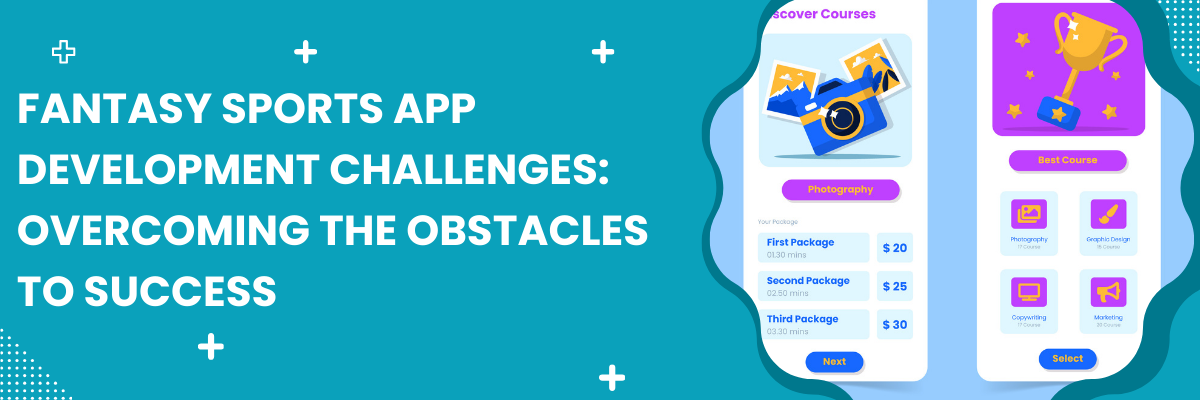Introduction
Fantasy sports apps have revolutionized the way sports enthusiasts engage with their favorite games. These platforms blend real-time sports analytics with interactive gameplay, enabling users to create teams, compete, and immerse themselves in the action. However, building a successful fantasy sports app is not without its hurdles. Developers and entrepreneurs face several challenges, from ensuring seamless real-time data integration to navigating legal complexities. This article explores the major challenges of fantasy sports app development and the strategies to overcome them, alongside a look at the benefits and future trends shaping the industry.
Statistics
Fantasy sports have become a global phenomenon. According to the Fantasy Sports & Gaming Association (FSGA), over 60 million users in the U.S. and Canada participate in fantasy sports. The global market was valued at approximately $20 billion in 2023 and is projected to grow at a CAGR of over 10% through 2028. This growth underscores the increasing demand for sophisticated and engaging fantasy sports apps, presenting both opportunities and challenges for developers.
Key Benefits
- User Engagement: Fantasy sports apps keep users actively involved with real-time data updates, live scores, and dynamic gameplay. This prolonged engagement boosts retention and monetization opportunities.
- Monetization Potential: Developers can implement multiple revenue streams, including in-app purchases, subscription plans, and advertisements.
- Scalable Business Model: With a growing user base, fantasy sports apps offer scalability, making them an attractive investment for businesses.
- Data-Driven Insights: These apps gather user behavior data, which can help businesses refine their strategies and personalize the user experience.
Challenges
- Real-Time Data Integration
Real-time updates are the backbone of fantasy sports apps. Users expect accurate, live data on player performance, injuries, and game statistics. Integrating such data from multiple sources requires robust APIs and an efficient backend infrastructure. Challenges arise in ensuring data accuracy, handling delays, and managing large volumes of information during peak usage periods.
Solution: Developers should partner with reliable data providers and employ cloud-based infrastructure to scale resources during high-traffic events.
- Legal and Regulatory Compliance
Fantasy sports apps often face legal scrutiny in different regions due to varying gambling laws. Navigating these regulations and ensuring compliance can be a complex and time-consuming process.
Solution: Engage legal experts to analyze local laws and secure necessary licenses. Transparent terms and conditions within the app can also build trust with users and regulators.
- User Retention and Engagement
The market for fantasy sports apps is competitive, with several well-established players. Retaining users and keeping them engaged poses a significant challenge.
Solution: Incorporate gamification elements, such as rewards, leaderboards, and seasonal tournaments. Regular updates and new features keep the platform fresh and exciting for users.
- Data Security and Privacy
Fantasy sports apps collect sensitive user information, including payment details and personal data. This makes them vulnerable to data breaches and cyberattacks.
Solution: Use end-to-end encryption, secure payment gateways, and regular security audits to protect user data. Adhering to privacy laws like GDPR or CCPA further strengthens trust with users.
- Seamless User Experience
An intuitive and bug-free interface is critical for user satisfaction. Poor design or frequent crashes can lead to user drop-offs.
Solution: Invest in user-centric UI/UX design and conduct rigorous testing to eliminate bugs and enhance functionality.
Future Trends
- AI and Machine Learning
Artificial Intelligence is transforming how fantasy sports apps operate. Predictive analytics powered by AI can offer users tailored recommendations, enhancing their decision-making and overall experience. - Blockchain Technology
Blockchain promises enhanced transparency and security in fantasy sports apps. Smart contracts can automate payouts, while NFTs (non-fungible tokens) could introduce unique player cards or collectibles, offering new revenue streams. - Augmented Reality (AR) and Virtual Reality (VR)
AR and VR technologies are expected to elevate user experiences by offering immersive features, such as virtual draft rooms or live match simulations. - Social Integration
The inclusion of social features like live chat, group leagues, and sharing achievements on social media will make fantasy sports apps more community-driven, attracting a broader audience. - Global Expansion
As fantasy sports gain popularity worldwide, developers are likely to adapt their platforms to cater to diverse sports and markets, from cricket in India to soccer in Europe.
Conclusion
Fantasy sports app development presents immense opportunities for businesses to tap into a booming market. However, the path to success is laden with challenges, from data integration and legal compliance to user retention and security concerns. By leveraging advanced technologies like AI, blockchain, and AR/VR, and addressing these challenges proactively, developers can create engaging, secure, and scalable platforms that meet user expectations. Collaborating with a professional Fantasy Sports App Development Company ensures access to expertise and cutting-edge solutions, paving the way for a successful venture in this dynamic industry.


